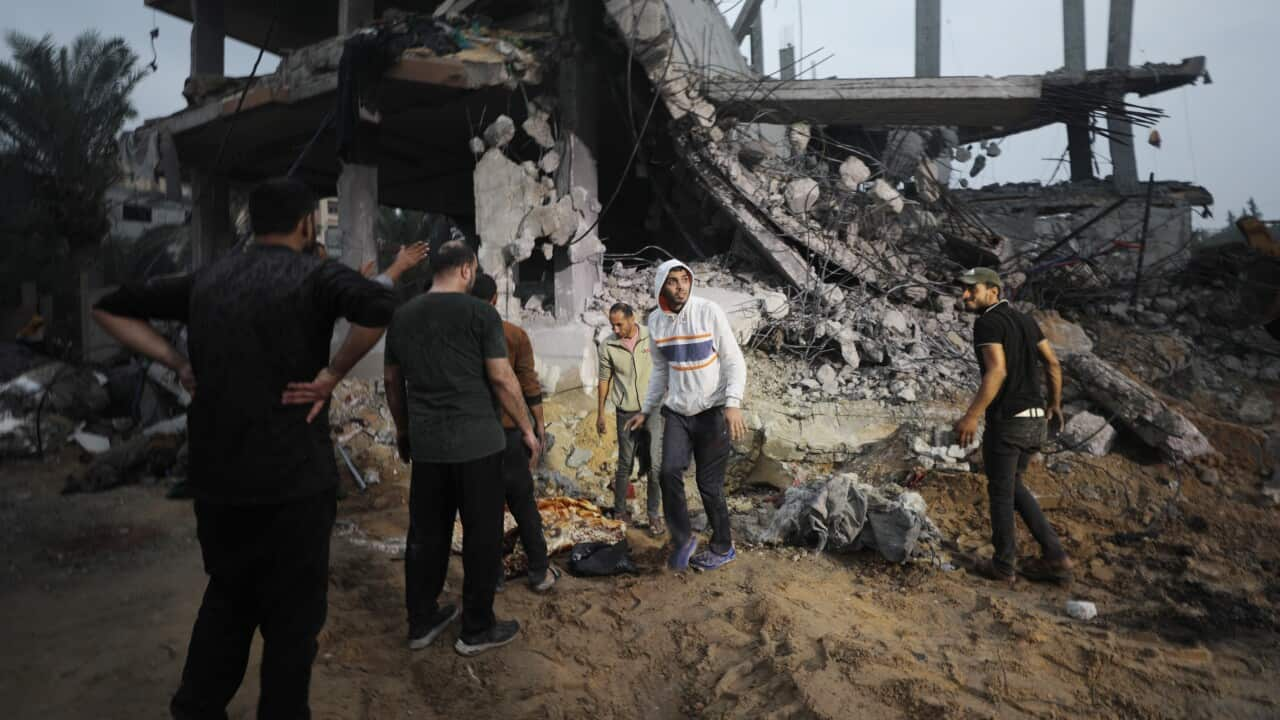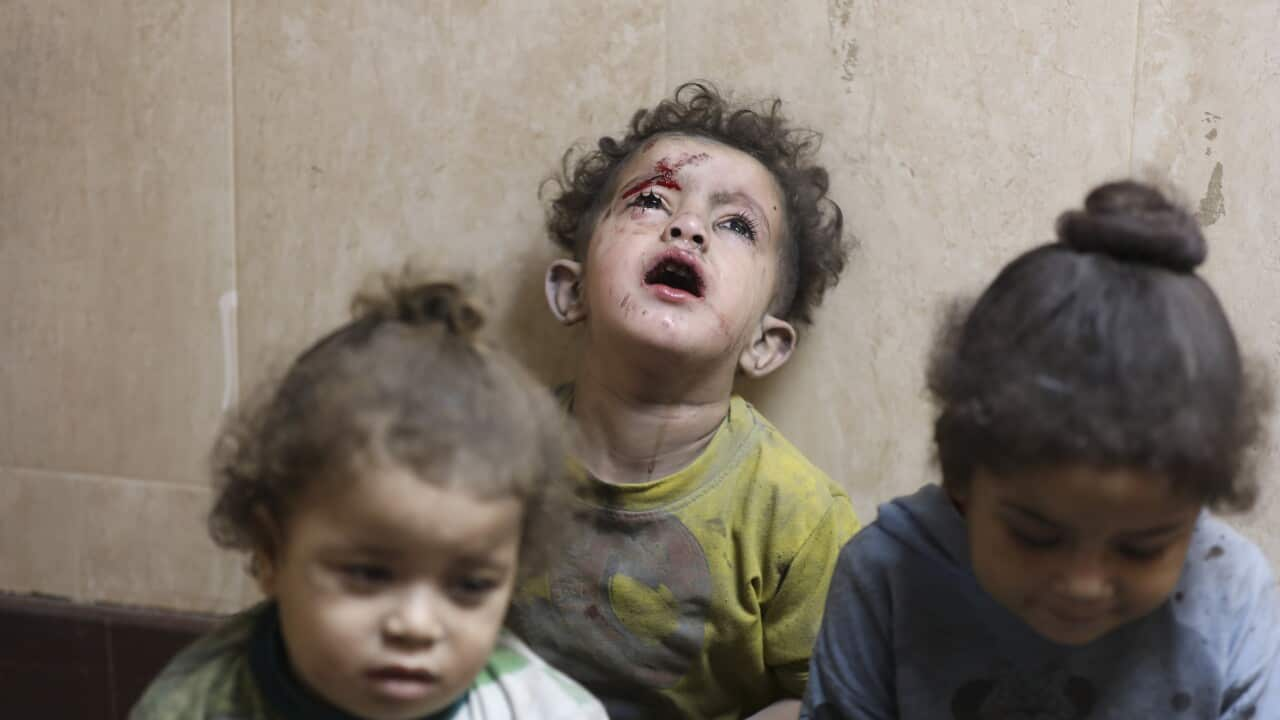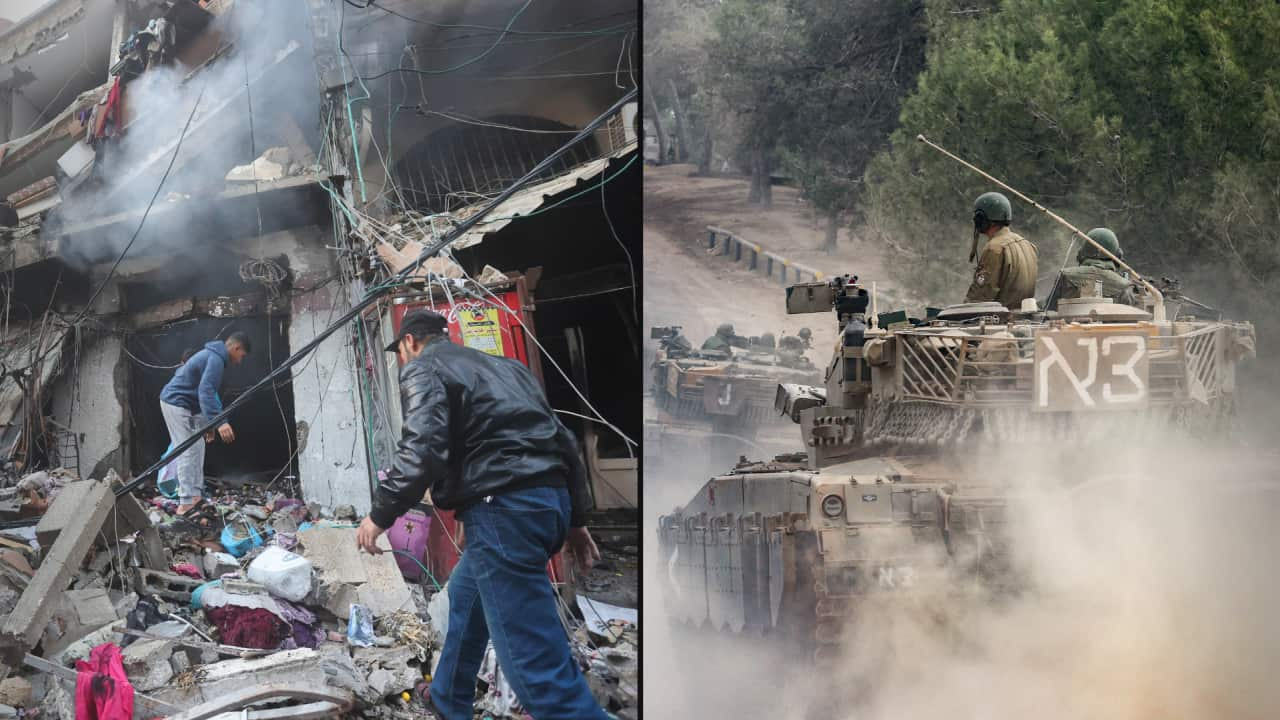Key Points
- Israeli forces have surrounded one of Gaza's main cities during one of the most intense days of combat in five weeks.
- Hospitals in Gaza are struggling to cope with the number of dead and wounded Palestinians.
- The United States has called on Israel to uphold international humanitarian law and reduce harm to civilians.
This article contains references to rape and sexual assault.
Israeli forces have stormed southern Gaza's main city in what they called the most intense day of combat in five weeks of ground operations against Hamas militants, and hospitals struggled to cope with scores of Palestinian dead and wounded.
In what appeared to be the biggest ground assault in Gaza since Israel said its troops - who were backed by warplanes - had reached the heart of Khan Younis and were also surrounding the city.
"We are in the most intense day since the beginning of the ground operation," the commander of the Israeli military's Southern Command, General Yaron Finkelman, said in a statement.
He said Israeli forces were also fighting in Jabalia, a large urban refugee camp and Hamas hotbed in northern Gaza next to Gaza City, and in Shuja'iyya, east of the city.
Hamas' armed wing, the al-Qassam Brigades, said its fighters had destroyed or damaged 24 Israeli military vehicles and snipers had killed or wounded eight Israeli soldiers in ongoing clashes in various areas of Khan Younis.
An Israeli military website listed two troop deaths for Tuesday and 83 since the ground operation began.
Separately, Gaza health officials said large numbers of people were killed in an Israeli strike on houses in Deir al-Balah, north of Khan Younis.
Dr Eyad Al-Jabri, head of the Shuhada Al-Aqsa Hospital there, told Reuters at least 45 were killed. Reuters could not reach the area or confirm the toll.
World Health Organization representative in Gaza, Richard Peeperkorn, says his biggest concern is around the vulnerability of Gaza's health infrastructure.
"The health infrastructures in Gaza, the health system, is crippled."
“The situation is getting worse by the hour. There's intensified bombing going on all around, including here in the southern areas, Khan Younis and even in Rafah," he said.
After days of ordering residents to flee the area, Israeli forces dropped new leaflets with instructions to stay inside shelters during the assault.
"Sixty days after the war began, our forces are now encircling the Khan Younis area," said Lieutenant General Herzi Halevi, chief of Israel's General Staff, referring to the October 7 Hamas incursion into Israel that triggered the conflict.
Israel unleashed its campaign in retribution for who rampaged through Israeli towns, killing 1,200 people and seizing 240 hostages, according to Israel's tally.
On 5 December, US President Joe Biden said Hamas had repeatedly raped women and mutilated their bodies during its Oct.7 assault on southern Israel, citing survivors and witnesses of the attacks.
In a statement on its Telegram channel, Hamas said it denounced Biden's "attempt to falsely accuse" its fighters of committing sexual violence and rape on 7 October.
Israeli police are investigating possible sexual crimes by some of the few hundred people that they arrested after the 7 October attack. Israel's justice ministry has said "victims were tortured, physically abused, raped, burned alive, and dismembered."
Since 7 October, more than 16,248 Palestinians are confirmed to have been killed by Israeli airstrikes and other actions, and the toll is rising each day, according to Gaza health officials. Thousands more are missing and feared buried under rubble.
"We're moving ahead with the second stage now. A second stage that is going to be difficult militarily," Israeli government spokesperson Eylon Levy said.
Israel, he added, is open to "constructive feedback" on reducing harm to civilians as long as the advice is consistent with its aim of destroying Gaza's ruling Islamist movement.
Hamas gained power in the Gaza Strip after winning legislative elections there in 2006. Its stated aim is to establish a Palestinian state, while refusing to recognise Israel's right to exist.
Hamas, in its entirety, is designated as a terrorist organisation by countries including Australia, Canada, the United Kingdom and the United States. Other countries list only Hamas' military wing as a terrorist group.
In 2018, the United Nations General Assembly voted against a resolution condemning Hamas in its entirety as a terrorist organisation.

Israeli troops were engaged in ground combat in the city of Khan Yunis in the southern Gaza Strip, the army said, as it expands operations. Source: Getty, Supplied / MAHMUD HAMS
US urges Israel to reduce civilian suffering but won't use military support as leverage
The US has again pressed Israel, its close ally, to uphold international humanitarian law and do more to reduce harm to civilians in . Despite the mounting death toll, it said Israel was now showing some receptiveness to the calls.
US officials have told Reuters that Washington had for now ruled out reducing military support to Israel, which they said would carry major risks.
"You start lessening aid to Israel, you start encouraging other parties to come into the conflict, you weaken the deterrence effect and you encourage Israel's other enemies," one official said.
A US State Department spokesperson on Tuesday urged Israel to do more to allow fuel and other aid into Gaza.
"The level of assistance that's getting in is not sufficient," Matthew Miller said at a press briefing. "It needs to go up, and we've made that clear to the government of Israel."
On Monday, 100 humanitarian aid trucks and about 69,000 litres of fuel were delivered to Gaza from Egypt, the UN said, about the same as Sunday.
"This is well below the daily average of 170 trucks and 110,000 litres of fuel that had entered during the humanitarian pause that took place between 24 and 30 November," UN spokesperson Stephane Dujarric told reporters on Tuesday.
Israeli assault has displaced 80 per cent of Gazans
Israeli bombardments have driven 80 per cent of Gaza's 2.3 million residents from their homes, most fleeing south. Crowded southern areas are now sheltering triple their usual population.
At Khan Younis' main Nasser hospital, the wounded arrived by ambulance, car, flatbed truck and donkey cart after what survivors described as a strike on a school being used as a shelter for the displaced.
Since the truce collapsed, Israel has been posting an online map to tell Gazans which parts of the enclave to evacuate. Khan Younis' eastern quarter was marked on Monday, home to hundreds of thousands of people, many of whom took flight on foot.
Gazans say there is no safe place, with remaining towns and shelters already overwhelmed, and Israel continuing to bomb the areas where it is telling people to go.
UNICEF spokesperson James Elder also said there is nowhere in Gaza that is free from bombardment.
"These are tiny patches of barren land, or they're street corners. They're sidewalks. They're half-built buildings. There is no water. Not a little bit. There's no water, no facilities, no shelter from the cold and the rain," Elder said, adding that the conditions were creating the "perfect storm" for disease outbreak.
"The only possible way to create safe spaces in Gaza that are truly safe, that protect human life, is for the hell to stop raining down from the sky,” Elder said.
Jordan's King Abdullah said on Tuesday the world should condemn any attempt by Israel to create conditions that would forcibly displace Palestinians within the war-devastated Gaza Strip or outside its borders.
In remarks carried by state media after a meeting with the Cypriot president in Amman, the monarch again called for an immediate ceasefire and warned that Israel's relentless bombing campaign was leading to a "dangerous deterioration" in the situation.
Readers seeking support with mental health can contact Beyond Blue on 1300 22 4636. More information is available at . supports people from culturally and linguistically diverse backgrounds.
If you or someone you know is impacted by sexual assault, call 1800RESPECT on 1800 737 732 or visit . In an emergency, call 000.





